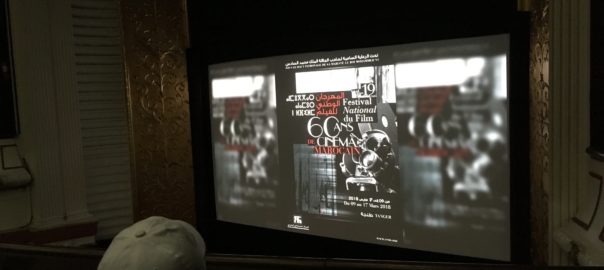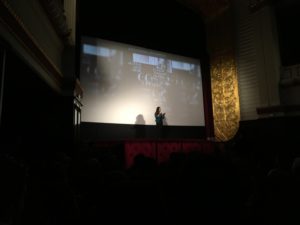
Established in 1982, the Festival National du Film (FNF) is devoted to screening the best of contemporary Moroccan feature films and short films from the previous twelve months. For the first seven editions, the festival took place sporadically, over 23 years in six different Moroccan cities. Then, in 2005, the 8th edition was held in Tangier, which has remained the home of the festival ever since – with a shift to the festival being held annually there since 2010. And so, this year, between 9-17 March, the attention of the Moroccan film industry (as well as the TMC research team) was focused on the 19th edition of the Festival National du Film in an unexpectedly rainy Tangier.
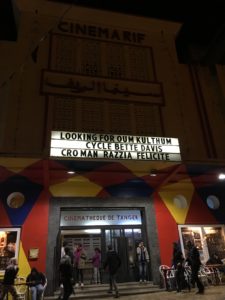
2018 was an important year for the festival in a number of ways. Firstly, it heralded the return of a number of key Moroccan filmmakers (including Faouzi Bensaïdi, Nour-Eddine Lakhmari and the newly appointed director of the Cinémathèque Marocaine, Narjiss Nejjar) whose work had been absent from the festival for too long, due to the rhythms of film production. Second, the 19th FNF was also an opportunity to celebrate the 60th anniversary of the ‘birth’ of Moroccan cinema, with a retrospective of classic Moroccan films running at the Cinéma Rif, alongside the fifteen features and fifteen short films that were being screened in competition a little way across town in the Roxy cinema. Parallel to the Moroccan cinema retrospective at the Rif were screenings of the hors compétition films, which included En Quête de la 7ième porte, a fabulous documentary on Bouanani by Ali Essafi. In conversations over mint tea or coffee between the screenings, there seemed to be as much talk about what had not been included in the retrospective of Moroccan cinema as there was around the selection of films in competition and those contemporary films screening hors compétition. Whilst it is, undoubtedly, a thankless task for any programmer to condense 60 years of Moroccan film history into a selection of fourteen films, the lack of a place in the selection for key films by Farida Benlyazid, Jilali Ferhati and Ahmed el Maanouni, was a surprise to me, at least.
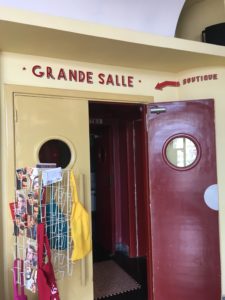
Lastly, and most importantly, this was a significant year for the diversity of contemporary films on offer, given talk in recent years of a possible ‘crisis’ in Moroccan cinema. This diversity was displayed not only in the aforementioned ‘return’ to the festival of contemporary Moroccan auteurs but also in experimental film such as Hicham Lasri’s Jahilya, alongside popular genre cinema such as Korsa (Toukouna, 2018) as well as original approaches to the established trend of Moroccan films exploring the politics and trauma of the Years of Lead in Kilikis…la cité des hiboux (Lamharzi, 2017), Cri de l’âme (Eljaouhary, 2018). Finally, it was to be found in the outstanding documentary House in the Fields (Hadid, 2017), whose strength merely served to highlight the fact that documentary was, regrettably, under-represented at this year’s festival in both the feature and short film categories – although more visible in the hors compétition section.
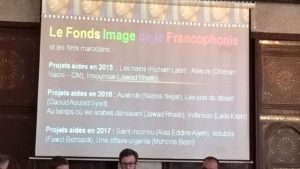
In addition to the films being screened in the three strands of this year’s festival there was a concerted effort by the CCM to bring together a series of industry panels on co-production and distribution with invited guests from across the world – as well as a pitch competition for young filmmakers, a screenwriting and development workshop run by both MediTalents (a trans-Mediterranean initiative to promote and develop the projects of emerging filmmakers from across the Mediterranean region) and a specialist workshop on documentary funding by FIDADOC. All of these sessions took place in the Hotel Atlas Rif on the seafront – a key hub of industry activity during the festival – offering a much-needed forum and visibility for Moroccan filmmakers to engage with, learn from and network with industry experts from within and beyond Morocco.
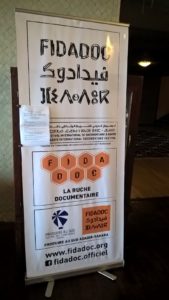
These kinds of activities have taken place in previous editions of the National Festival: see for example Jamal Bahmad’s blog entry from last year’s FNF on the panel discussion on distribution and exhibition. However, there did seem to be a more consciously transnational outlook to this year’s industry focused events – an indication, perhaps, that more needs to be done to promote Moroccan cinema internationally in ways that have not always been presented as a priority in this and other Moroccan festivals (most notably and somewhat paradoxically, at the Marrakesh International Film Festival, where the focus has been on the glitz and glamour of the red carpet).
In the coming weeks, the TMC team will offer a series of more in-depth blog posts focusing on specific aspects of the festival mentioned above, as well as, of course (!) reactions and analyses of the films themselves that made up the 19th Festival National du Film. To be continued…
Will Higbee
